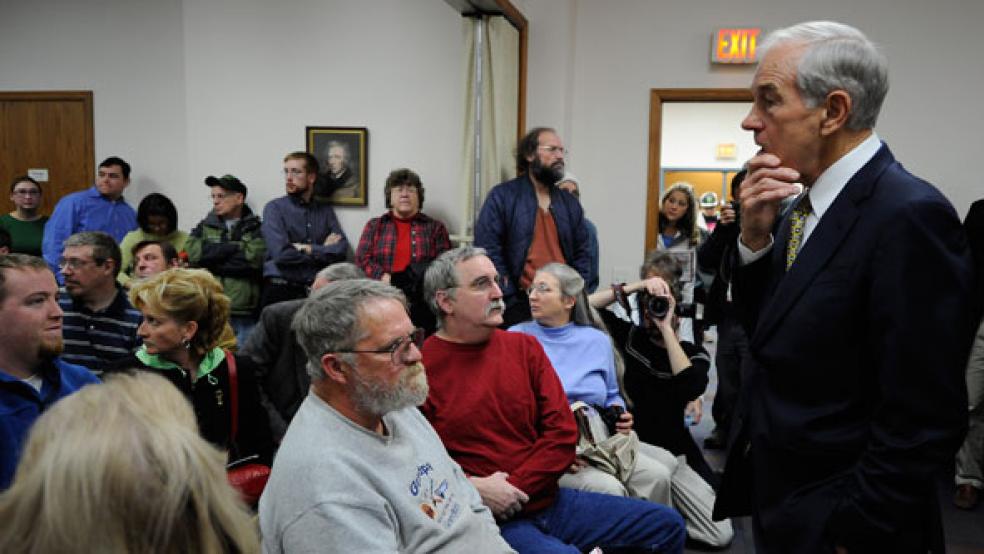For much of the year, Rep. Ron Paul of Texas has been treated by the media like the crazy uncle in the attic – a grizzled 76-year-old veteran politician whose persistent popularity among libertarians and Tea Party conservatives had to be a fluke. After all, how could one take seriously a Republican presidential candidate who wanted to abolish the Federal Reserve, obliterate five major federal departments, abruptly bring home all the troops from Afghanistan and Iraq, and legalize pot.
But with the Iowa caucuses only weeks away and Paul running a solid second in some polls, news organizations and political analysts are suddenly treating the Texas politicians with greater deference. And some are now wondering whether the cantankerous veteran House member will play spoiler to former House Speaker Newt Gingrich or former governor Mitt Romney, or even mount a third-party campaign that could indirectly help President Obama in the general election.
The big news, obviously, is Gingrich’s remarkable political comeback and surge in the polls, showing him at this point the easy victor over Romney and the rest of the Republican field in Iowa, South Carolina and Florida. Gingrich far and away is the most dynamic, compelling and knowledgeable candidate in the mix. The overarching question – amplified by the tough attacks he drew from his competitors in Saturday night’s Des Moines debate – is whether Gingrich can overcome his ample political baggage as a serial divorcee, K Street moneybags and self-immolating political figure to prevail in what could be a protracted and messy primary season.
While Gingrich revels as his party’s flavor of the month – the latest in a long line of pretenders to the GOP throne including Rep. Michele Bachmann, Texas Gov. Rick Perry and former Godfather’s Pizza CEO Herman Cain – Paul has relentlessly soldiered on to build a small but rock-solid group of loyalists among Tea Party conservatives, libertarians, border -line anarchists and highly motivated college students and young people who are enamored of his unflinching set of conservative values.
Some of his advisers say his views on debt, deficits and the destruction of the dollar are shared by the overwhelming percentage of people who call themselves Republican, the Washington Post notes. The other candidates have joined him this time around in his attacks on the Federal Reserve and its chairman, Ben Bernanke.
Paul’s well-financed campaign is running a commercial condemning Gingrich as a hypocrite. And, during the Saturday night debate, he went after the former House speaker, saying he’s had multiple positions “on so many issues” and has taken positions that are not conservative.
“He supported the TARP [bailout],” Paul said. “The other thing really which should annoy a lot of people, he received a lot of money from Freddie Mac.” Paul went on to suggest Gingrich effectively received taxpayer money from the beleaguered and much derided mortgage giant. Gingrich countered with a smile that he was “in the private sector,” prompting Romney to say, “K Street is not the private sector.”
On Sunday morning, Paul was the lead guest on NBC’s “Meet the Press” show, and the subject of flattering analyses in the Washington Post and other news outlets. Conservative columnist George Will speculated that Paul could well play a pivotal role in helping Obama hang on to win a second term, by undercutting the eventual GOP nominee in key battle ground states.
As Will sees it, even if Paul could win between 5 percent and 7 percent of the vote nationally, that might help Obama carry two states he lost in 2008, Missouri and Arizona, while enabling Obama to again carry Florida, Indiana, North Carolina and Virginia. It would also secure Obama’s hold on states that Republicans would like to try to take back next year, namely New Mexico, Colorado, Nevada, Michigan, Ohio, Pennsylvania and New Hampshire.
“His supporters are inclined to accept no substitute because no other candidate espouses anything like his high-octane blend of libertarianism and isolationism,” Will said. “His intense supporters probably could get his name on most states’ ballots. He is not seeking reelection to his House seat, so what has he got to lose?”
Pressed by “Meet the Press” host David Gregory on whether he might run as a third-party candidate, Paul was cagey, saying that “I’m not even thinking about it. I have enough on my plate.”
Paul said that for now, he would enjoy his hard-earned notoriety and forge ahead in the GOP contest, with his fingers crossed, to see how well he can do in Iowa, New Hampshire and the other early primary and caucus states. Under further grilling by Gregory, Paul insisted, “I have no plans” to mount a third-party campaign, but “I’m not going to rule anything out or anything in.”
Paul did little to hide his utter disdain for Gingrich, his one-time colleague in the House, and he would clearly prefer to see Romney win the nomination if it came down to a choice between the former Massachusetts governor and Gingrich. For sure, he said, Romney and Gingrich “come from the same mold” in their willingness to bend or alter their conservative principles. “I think their philosophies are pretty close,” Paul said, adding that he likes Romney more because “I think Mitt has a more diplomatic tone to his voice.”
Paul seemed most offended by the revelation that Gingrich had accepted $1.6 million in consulting fees from Freddie Mac over an eight-year period to offer “strategic advice,” only to turn around later and publicly attack the policies of the quasi-government agency and its role in creating the mortgage and financial crisis.
Asked by Gregory whether Gingrich should return the money to Freddie Mac, Paul replied, “Legally he doesn’t have to, but morally,” he should.





